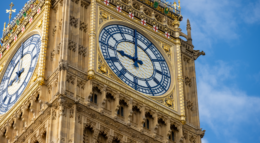
Trump’s bi-polar State of the Union explained
US President Donald Trump delivered his annual State of the Union on Tuesday night, a week late, due to a budget dispute that was postponed but not resolved, so this speech started (and ended) with calls for bi-partisanship. He suggested that politicians should govern "not as two parties, but one nation," that they should aim to win "for our country" and the "common good," rather than any particular party.
Most of the rest of the speech was not bi-partisan so much as bi-polar, in the sense that it mixed both left-wing and right-wing appeals, at a time of flux in conventional left-right identities.
This surprising bi-polarity needs more explanation in the four main areas of the speech's own choosing: in national security, he mixed scepticism of military intervention with confrontation; in economics, he mixed gains for minorities with a focus on the middle class; in social policies, he promised interventions and protections at the same time as he drew a line against socialism; and in border control, he spent more time on the social justifications for controlled immigration than the requirement for a border wall.
NATIONAL SECURITY
The speech's first policy area was foreign policy. Consistent with his campaign promises in 2016, Trump promised "a foreign policy that puts American interests first." Inevitably, national security follows. He boasted of the "most powerful military on earth…America is again winning each and every day…The strength of our union is strong."
This mandatory line drew a mandatory standing ovation, supplemented by Republican chanting of "USA! USA! USA!" Trump quipped: "That sounds so good!" Later, Democratic Congresswomen – wearing white to mark 100 years since female enfranchisement, or Trump's sexism (depends whom you ask) – falteringly worked out that they could stand to cheer themselves any time Trump boasted of female advancement. Finally, they too chanted "USA! USA! USA!" By the way, lest you're tempted to use this as proof of bipartisanship, ponder whether their chanting was cultural appropriation, or ironic, or patriotism without nationalism, or anything else that the left-sliding Democrats tie themselves up in knots about.
Trump's speech also got tied up. Too many declarations lingered in the air like unclaimed orphans. For instance, he said there is "nothing in the world that can compete with America." Given the placement, this was probably a proposition about American's continuing hegemony, but it could have been about economic security, given the subsequent theme, but the transition was too abrupt to be sure.
Often, this speech seemed unpolished, without link-backs, contexts, or set-ups, so some points were lost. Topics sometimes changed from one sentence to another. Transitions were muddy. The President's delivery was not at fault – he spoke carefully and emphatically, and delivered off-the-cuff quips when interrupted.
The clumsiest transition was from the strength of the union to the weakness of his ethos, although I suppose his speech-writers were trying to get to the low point from a high point. At the same time, the speech clumsily linked two issues: his withdrawn foreign policy and the opposition's scrutiny of his campaign links with Russia. He urged Congress to end "foolish wars" and "ridiculous partisan investigations." He proposed "peace and legislation, not war and investigation." A groan arose from the floor. I doubt such linkage could persuade an opponent, or make sense to the layperson.
Curiously, he next wasted time on a vanity proposal ("back to space on American rockets," in contrast to using Russian rockets for civilian missions), before getting to current international issues. He boasted that NATO members have increased defence spending, he had recognized Jerusalem as the capital of Israel, he had recognized opposition rule in Venezuela, and North Korea hasn't fired a ballistic missile in 15 months.
On North Korea, he made an egotistical boast: "If I hadn't been elected…we would be in a war with North Korea right now." He claimed too that his Middle East "approach is based on principle and realism," before admitting his dramatic withdrawal from Syria and negotiation with enemies in Afghanistan. He reminded everyone that the US has been involved in Middle Eastern wars for almost 19 continuous years: "Great nations do not fight endless wars." He justified withdrawal from Syria on the grounds that the Islamic State has lost most of the 20,000 square miles that it controlled at the time he came into office. He justified his quest for a "political settlement in Afghanistan," including with the Taliban, in order to restore US "focus on counter-terrorism."
He transitioned then to a promise to "confront" Iran – which he called the largest state sponsor of terrorism. He boasted of his withdrawal from the Iranian nuclear deal that the Obama administration had negotiated, and of imposing the toughest ever sanctions in 2018.
He barely mentioned Russia, and the mention was almost a boast about mutual advantage: his withdrawal from the Intermediate-Range Nuclear Forces Treaty liberates both the US and Russia from restrictions that never applied to their mutual competitors Iran and China.
ECONOMICS
Trump's second area of focus was the economy, and here he was on strong ground: Whoever writes his economic speeches has far greater competence than the writer of his foreign policy. The list of achievements just kept coming, and were cleverly framed to appeal to both conservatives and progressives.
He boasted that "blue-collar workers" had seen their wages grow faster, African-American and Hispanic unemployment had fallen to record lows, women filled 58 percent of the new jobs in 2018, more women are in the workforce than ever before, more women are in Congress than ever before, and the economy is growing almost twice as fast today than when he took office (although opponents will point out the usual caveats, such as the increasing gap between rich and poor).
Trump asserted his differentiation by championing workers not shirkers. He appealed to Congress to help him "make the middle class bigger and more prosperous." He boasted about cutting taxes for "working families", and cutting regulations affecting business. Trump urged his opponents to choose "greatness over gridlock…I ask you to choose greatness."
Turning to international trade, he boasted, hyperbolically, that the "theft of American jobs and wealth has come to an end," thanks to his confrontation with China's "unfair trade practices" and his own protectionism. He boasted too of replacing NAFTA (North American Free Trade Agreement) with the US Mexico Canada Agreement. He urged Congress to pass the Reciprocal Trade Act to allow automatic imposition of the same tariff that any foreign authority imposes on the US.
SOCIAL POLICIES
Trump offered a long list of ambitions in home affairs that Democrats will struggle to oppose: lowering the cost of healthcare, protecting patients with pre-existing conditions, eliminating AIDS, fighting childhood cancer, increased accountability for care in the Veterans Administration, widening school choices by issuing vouchers to parents, nationwide paid parental leave, and more investment in infrastructure.
Trump ended his liberal social policies by drawing a line at socialism. He said he was "alarmed at calls to adopt socialism…America will never be a socialist country." Republicans stood with alacrity, and again chanted "USA!"
BORDER CONTROL
Trump warned Congress that it has ten days left to pass a bill to "secure our border," "end illegal immigration," put cartels "out of business," and reduce the trafficking of drugs, arms, children, and sex workers. These objectives overlap his opponents' social objectives, and were well articulated.
However, his next statements were poorly explained, and stimulated groans. He said he had ordered another 3,750 troops to the southern border in response to a new caravan of migrants. Here, his speech-writers inexplicably failed to explain why he needs a new deployment beyond the deployments ordered last year. What the speech didn't say was that the caravans of 2018 ended up in the San Diego sector because Texan cartels had warned against the shorter route to Texas. Caravans (enabled by charities and local authorities) are bad for everyone, including organized criminals, who are left out of the trafficking, and are caught up in more federal attention.
Nor did the speech explain what is at dispute in the budget. Trump's request in 2018 was for funds to improve the existing walls in those sectors where most trafficking occurs – not the whole border, not even a majority of the border. He pointed out that in 2017 he had provided emergency funds to improve the San Diego sector, which "used to have the most illegal crossings", until its few dozen miles of wall were improved in 2018. He stated that "walls go up, illegal crossings go down" (this is true – don't go searching for a fact checker) and that "walls work, walls save lives." Moreover, as he partially explained, the funding request isn't just for a wall, but for a package of other capabilities, such as drug detection dogs and motion sensors.
Trump went on to describe the "very dangerous southern border," and the "lawless state of our southern border," as a "threat" to physical and economic security. As the groans built, the speech-writers had thought to head them off with the declaration that "legal immigrants strengthen our society." Most Democrats stood to applaud that one.
Trump declared that he wants more immigration, but it must be legal. He cleverly appealed to the sensible majority by explaining that nothing divides the working classes from the political classes more than immigration. He attacked those politicians who live in walled communities and don't suffer the pressures on social services from illegal immigration, but signal their virtues by encouraging uncontrolled immigration. "Tolerance for illegal immigration is not compassionate, it is actually very cruel," he said.
Trump then returned to defiance: "I will get it [the wall] built," which implies that he still wants to build a wall along the whole border – he will surely be misquoted to suggest that the current budgetary impasse is about the whole border instead of a few sectors.
The speech did not end with border control (it actually returned to foreign policy), but his concluding hyperbole was most pertinent to the battle next week over the budget request. "Look at the opportunities before us," he said. "Our biggest victories are still to come." "Dare to transcend" our "differences." "Reignite the American imagination…Set sights on the brightest star…I am asking you to choose greatness." Let us "go forward together, keep America first in our hearts." Be the "light" for "all the nations of the world."















